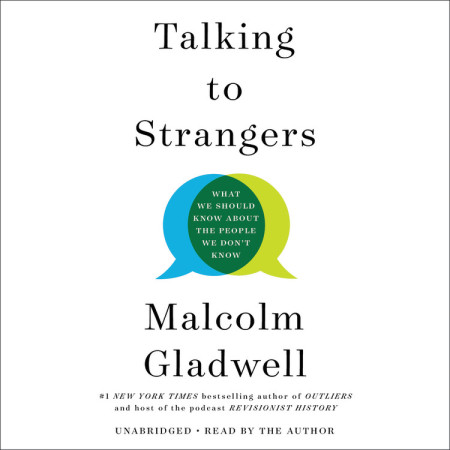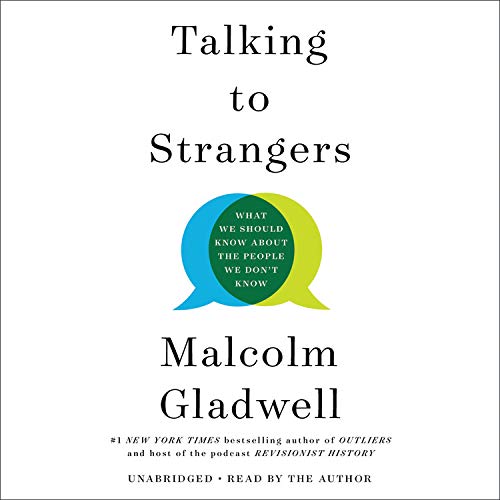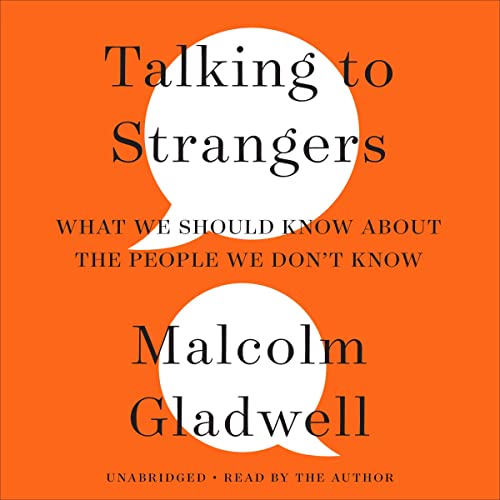“Talking to Strangers” by Malcolm Gladwell explores the complexities of human communication and misunderstanding. The audiobook delves into why we often misinterpret strangers.
Malcolm Gladwell’s “Talking to Strangers” offers a deep dive into the intricacies of human interactions. The book dissects various high-profile cases, revealing how our assumptions can lead to misjudgments. Gladwell uses compelling storytelling to illustrate the gap between what we think we know and the truth.
Each chapter uncovers the pitfalls of trusting our instincts when dealing with strangers. From law enforcement to international diplomacy, the book highlights the consequences of our communication failures. “Talking to Strangers” encourages readers to rethink their first impressions and understand the hidden dynamics in every interaction. It’s a must-listen for anyone interested in psychology and human behavior.

Decoding ‘talking To Strangers’
Malcolm Gladwell’s audiobook ‘Talking to Strangers’ explores why humans often misjudge each other. This work delves into our social interactions, misunderstandings, and the assumptions we make.
Key Themes And Concepts
In ‘Talking to Strangers’, Gladwell discusses several key themes:
- Transparency Illusion: The belief that we can read others easily.
- Default to Truth: Our tendency to trust others.
- Context Matters: Situations influence our judgments.
Gladwell’s Approach To Social Misunderstandings
Gladwell uses real-life stories to illustrate social errors. He examines cases like:
- The Amanda Knox trial
- The Bernie Madoff scandal
- The Sandra Bland incident
Through these stories, Gladwell shows how we misinterpret behavior. He suggests we often fail to understand strangers due to our biases and assumptions.
| Case | Key Misunderstanding |
|---|---|
| Amanda Knox | Misjudging emotions and behavior |
| Bernie Madoff | Trusting appearances |
| Sandra Bland | Contextual misinterpretation |
Insights From The Audiobook Experience
Malcolm Gladwell’s Talking to Strangers audiobook provides a unique listening experience. It goes beyond traditional narration, offering deep insights through audio. Discover what makes this audiobook stand out.
The Power Of Audio: Voice And Tone
The power of audio lies in its ability to convey emotion. Gladwell’s voice adds depth to his words. His tone varies, making key points stand out. This helps listeners connect with the content more deeply.
Voice and tone play crucial roles in storytelling. Gladwell’s careful modulation captures attention. He uses pauses effectively to emphasize important ideas.
The audiobook includes different voices. This variety keeps the listener engaged. Each voice brings a unique perspective to the narrative.
Enhanced Understanding Through Interviews And Reenactments
Interviews and reenactments enrich the audiobook experience. They provide real-world context to Gladwell’s points. Listeners hear directly from experts and witnesses. This adds credibility and interest to the material.
- Interviews with experts give deeper insights.
- Reenactments make historical events feel immediate.
- Real voices create a connection with the listener.
Gladwell includes dialogues from pivotal moments. These reenactments help listeners visualize the scenarios. Hearing the emotions in these dialogues adds another layer of understanding.
The audiobook also features sound effects. These effects enhance the storytelling. They make the listening experience immersive and engaging.
| Feature | Benefit |
|---|---|
| Voice and Tone | Conveys emotion and emphasis |
| Interviews | Provides expert insights |
| Reenactments | Makes events feel immediate |
| Sound Effects | Creates an immersive experience |
Critical Reception And Impact
Malcolm Gladwell’s audiobook, Talking to Strangers, has garnered significant attention. The work delves into the complexities of human interactions and misunderstandings. Here, we explore its critical reception and broader impact.
Public And Critical Response
The public reception of Talking to Strangers has been diverse. Many listeners praise Gladwell’s unique storytelling style. They appreciate the deep insights into human behavior.
- Positive reviews highlight the engaging narrative.
- Critics note the thorough research and compelling anecdotes.
- Some listeners find the content thought-provoking and enlightening.
On the other hand, some critics argue the book’s conclusions are overstated. A few listeners feel the audiobook could be more concise.
| Aspect | Public Opinion |
|---|---|
| Storytelling | Highly engaging and immersive |
| Research | Thorough and well-documented |
| Length | Somewhat lengthy for some listeners |
Influence On Social Psychology And Communication
Gladwell’s audiobook has significantly influenced social psychology and communication studies. It brings to light the complexities of human interactions. The book explores how we often misinterpret strangers’ intentions.
- Highlights the importance of context in understanding others.
- Challenges common perceptions about trust and communication.
- Encourages deeper reflection on our biases.
Many educators and psychologists use Talking to Strangers as a teaching tool. It offers fresh perspectives on how we communicate and understand each other.
Overall, the audiobook has sparked important conversations. It has made a lasting impact on how we view and interact with strangers.


Conclusion
Malcolm Gladwell’s “Talking to Strangers” audiobook offers eye-opening insights. It challenges how we perceive and interact with others. This audiobook is a must-listen for anyone interested in human behavior. Enhance your understanding of social interactions and biases today. Dive into “Talking to Strangers” and transform your perspective.



